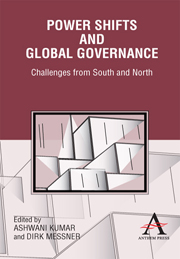Book contents
- Frontmatter
- Contents
- List of Contributors
- Foreword
- Power Shifts and Global Governance
- Part One Theoretical and Analytical Reflections on Global Governance
- Part Two Power Shifts, Regional Experiences and Global Challenges
- Part Three Case Studies in Global Governance
- 13 Unity in Diversity: South Coalitions as Governance Adaption Vehicles in Global Trade Governance
- 14 In the Foggy Middle East: Just Wars Remain the Name of the Game
- 15 Evaluation Capacity Development in the Arab Region: How Monitoring and Evaluation is Perceived and Applied?
- 16 UNEP Institutional Reform with its Impact on Developing Countries
- 17 The Heiligendamm Process and Emerging Powers: More of the Same or a Genuine Global Governance Innovation?
- Notes
13 - Unity in Diversity: South Coalitions as Governance Adaption Vehicles in Global Trade Governance
from Part Three - Case Studies in Global Governance
Published online by Cambridge University Press: 05 March 2012
- Frontmatter
- Contents
- List of Contributors
- Foreword
- Power Shifts and Global Governance
- Part One Theoretical and Analytical Reflections on Global Governance
- Part Two Power Shifts, Regional Experiences and Global Challenges
- Part Three Case Studies in Global Governance
- 13 Unity in Diversity: South Coalitions as Governance Adaption Vehicles in Global Trade Governance
- 14 In the Foggy Middle East: Just Wars Remain the Name of the Game
- 15 Evaluation Capacity Development in the Arab Region: How Monitoring and Evaluation is Perceived and Applied?
- 16 UNEP Institutional Reform with its Impact on Developing Countries
- 17 The Heiligendamm Process and Emerging Powers: More of the Same or a Genuine Global Governance Innovation?
- Notes
Summary
Introduction: Rapidly Changing Global Economic Scene
The geo-political and economic map of the world is rapidly changing. Global institutional arrangements borne out of the historical experiences of the midto late twentieth century will need to adjust to the new global political and economic context that is now evolving, even as the post-World War II issue of promoting the development of developing countries continues to remain at the centre of international economic policy debates.
A major aspect of this new context is the development of new international policy regimes and the institutional architecture relating to these regimes that have an impact on developing countries' development policies and prospects. These include a new institutional architecture on global trade policy represented by the World Trade Organization (WTO), complete with a more comprehensive set of trade rules that are binding on countries, and whose work both influences and is influenced by the work of other existing trade-related global institutions such as the UN Conference on Trade and Development (UNCTAD).
Another aspect of this new context is the increasing share and influence of developing countries in global economic affairs – both in terms of shaping global economic policy and in terms of actual weight in the global economy.
- Type
- Chapter
- Information
- Power Shifts and Global GovernanceChallenges from South and North, pp. 239 - 264Publisher: Anthem PressPrint publication year: 2010
- 1
- Cited by

